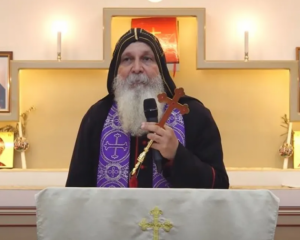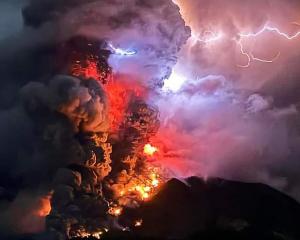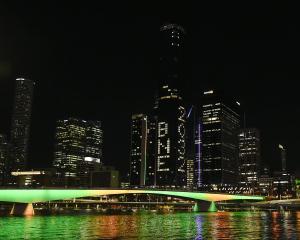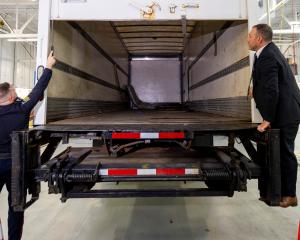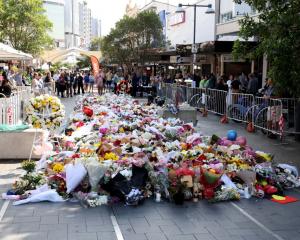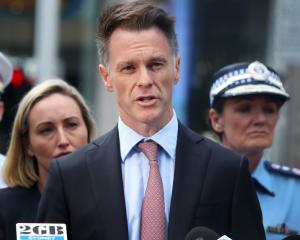
Meeting the Ukrainian delegation, Russian Prime Minister Dmitry Medvedev said their country needed "stability and order", in the two sides' first high-level talks since Kiev pulled out of a planned trade alliance with the European Union, provoking mass protests.
Prime Minister Mykola Azarov also accused the opposition of trying to provoke violence, and tension remained high in Kiev with protesters confronting ranks of black-helmeted riot police in front of President Viktor Yanukovich's main offices after his government's U-turn in trade policy back towards Russia.
The crisis has again exposed a tug-of-war playing out in Ukraine, which has oscillated between the EU and former master Moscow since the "Orange Revolution" nine years ago which overthrew the post-Soviet political order.
The leader of the far-right nationalist party, Svoboda, announced a march on Wednesday to the interior ministry, but no clashes between protesters and riot police were reported.
With foreign ministers from the OSCE human rights watchdog arriving in Kiev for a two-day meeting from Thursday, Azarov tried to project an image of being in control in the absence of Yanukovich, who has gone to China for an official visit.
Urging all political forces to avoid a further escalation of tension, Azarov said: "Everybody must realise that the country's constitution and laws are in force, nobody is allowed to violate them ... All those who are guilty of illegal acts will answer for them".
Azarov later accused the opposition of trying to stir up trouble. "We know there are 2,500 fighters who are being used as a force with which to provoke law enforcement structures to resist. We are showing that we do not use force, but the opposition does use force," he told the visiting secretary general of the Council of Europe, Thorbjorn Jagland.
Despite the turmoil, Yanukovich flew to China on Tuesday and Chinese state media said he was visiting the Terracotta Warriors archaeological site and an aircraft factory in Xian.
Beijing has already provided Ukraine $10 billion in loans, but Kiev needs billions more next year for gas bills and debt repayments. China's foreign ministry made a noncommittal response to a query whether Beijing would provide any more aid to Ukraine.
In Moscow, the delegation led by a deputy prime minister, Yuri Boiko, was seeking lower prices for Russian natural gas and aid to close gaping external deficits that could set off a balance of payments crisis.
"You are having quite an active political season," Medvedev told Boiko drily in the meeting at his residence outside Moscow, according to Interfax news agency. "Of course this is an internal matter, but it is very important that there be stability and order in the country."
Azarov told his cabinet in Kiev that the Boiko visit would continue a dialogue with Russia on trade and economic relations that are "very critical for maintaining and developing Ukrainian industry and economy".
Russian President Vladimir Putin had threatened financial sanctions against Kiev if it signed the trade agreement with the EU last month. Yanukovich abandoned the deal at the last moment, surprising European leaders and angering his domestic critics.
Ukraine's central bank intervened again on the currency market to support the value of the national hryvnia currency, amid concerns that its stock of foreign reserves of $20 billion will be sufficient to hold the line.
The cost of insuring Ukrainian government debt for five years rose to 1,097 basis points, near-four-year highs. Levels over 1,000 basis points are indicative of financial distress.
SUSPENDED SESSION
Opposition deputies forced parliament to suspend its session, blockading the speaker's rostrum to further their demands for Yanukovich to dismiss Azarov and his team.
Pro-Europe demonstrators have set up a large encampment on Independence Square - scene of the 2004-5 "Orange Revolution" - and monitor news events from a giant television screen.
Mobile snack bars dispense soup and hot drinks. People huddle round blazing braziers set up on the street. At Kiev's city hall, which protesters have occupied since Sunday, people dozed on the floor while others passed through the revolving doors for handouts of food and warm clothing.
The challenge for the opposition now appears to be how to sustain the momentum for change and keep people on the streets as temperatures begin to drop and the harsh Ukrainian winter sets in.
Ukraine faces huge problems to finance a big current account deficit. Cheaper Russian gas would buy time for Kiev to find ways to meet outside funding needs estimated at $17 billion next year.
Despite reports that Ukraine's Naftogaz had won deferral until spring of payments of gas bills for the last three years, Gazprom chief executive Alexei Miller said Kiev owed just over $2 billion for three months of deliveries and no agreements had yet been reached on settling the debt.
Azarov's government survived an attempt to topple it in parliament on Tuesday in a rough encounter with opposition parties at which he had apologised for police heavy-handedness in which scores of people were hurt.
Trying to defuse protests, the government has defended its foreign policy switch by saying that it marks only a "pause" in moves to integrate further with Europe, rather than an about-turn. As if to underscore this point on Wednesday, Azarov said a delegation would also leave soon for Brussels.
ROUTES TO POWER BLOCKED
Hundreds of protesters, bearing the national flag or the standard of opposition political parties, rallied on Wednesday near official buildings, but found many routes blocked by vehicles which interior ministry forces had stationed across streets and approach roads.
"We don't like this government, young people in Ukraine want to join Europe. We want to be able to study and work freely in Europe, that is where Ukraine's future lies," said Christina Yavorskaya, 21, a student from the Chernobyl district in western Ukraine. "We want European salaries, a European way of life. There is no future with Russia."
"There is a chance of getting these bandits out of office. And as long as there is that chance, we'll be standing here," said Misha Skoropad, 38, who came on a bus from the western city of Lviv to protest near the presidential headquarters.
The opposition is a loose alliance of political factions ranging from pro-EU liberals to hardline nationalists, without a galvanising figure in the mould of Yulia Tymoshenko, who co-led the Orange Revolution but was jailed for abuse of power after Yanukovich became president.
Some analysts see Vitaly Klitschko, a heavyweight boxing world champion and now leader of the opposition Udar (Punch) party, emerging from the pack, though he is largely untested.



